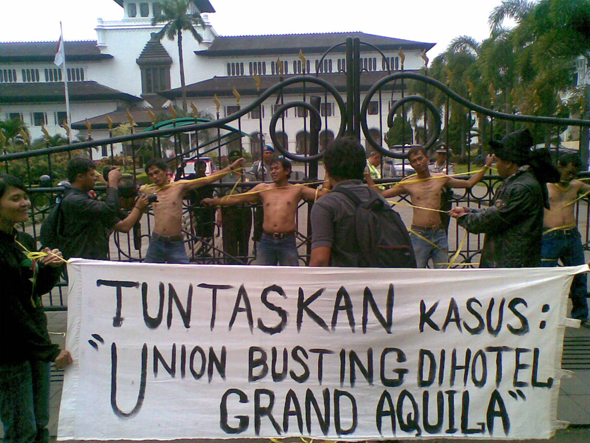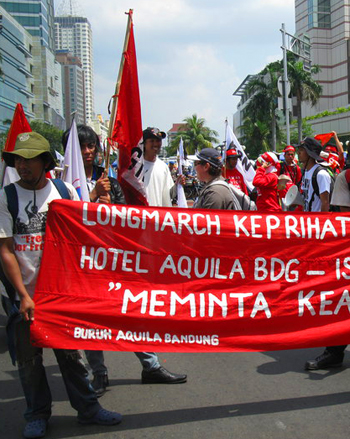A three year campaign by hotel workers in Bandung shows how Indonesian workers are free to organise - and employers are free to resist
Workers march from Bandung to JakartaSerikat Pekerja Mandiri Grand Aquila Bandung |
Since September 2008, the Grand Aquila Hotel in Bandung has been embroiled in a labour dispute that has forced business people to cross paths with picketers and street performers. The dispute began when workers complained that management was not fairly and transparently distributing tips and service charges to hotel employees. Finding hotel management unresponsive to their concerns, workers decided to hold a congress in which they formed a new labour union to represent their interests in the workplace. When hotel management refused to recognise the workers' newly formed union, the seemingly minor dispute turned into a three year organising campaign that has gained national and international attention and has become a contest over the right of Indonesian workers to organise labour unions.
On October 2008, workers informed the hotel general manager that they had organised a local union affiliated with the Federation of Independent Labour Unions (FSPM), a national union federation representing hotel and restaurant workers. The next day, the general manager dismissed the union chairperson and two other officers and had them escorted by security from the building. Management then held meetings with union members, threatening them with dismissal, demotion or pay reductions if they continued their union activities. The workers responded by demanding that management reinstate the union leaders.
The negotiations that followed, mediated by the Bandung Manpower Office, were ultimately unsuccessful. Things came to a head on 1 December 2008, when management held meetings with each department of the hotel and informed workers that they had five days to either give up their union membership, accept a pay reduction or tender their resignation. Workers responded by informing management that if the union leadership was not reinstated and the union recognised, the workers would go on strike.
When the 6 December deadline came around, the workers followed through on their threat. They held a one-day work stoppage, gathering in the lobby of the hotel and demanding a meeting with the hotel general manager. The general manager refused to accede to their demand, and the next day distributed a list to hotel security of names of 128 workers involved in the action, barring the workers from the hotel premises and effectively terminating their employment. In total, 137 workers were fired for union involvement.
These worker dismissals in retaliation for union activity come as little surprise in a context where union-busting is still rife. But what came next was more unexpected. Instead of accepting their fate, the sacked workers launched a lengthy and dynamic campaign to fight for their rights.
Lobbying for government support
Following the initial firing of union activists, the workers held a series of demonstrations targeting local policy makers. Workers lobbied the West Java Ministry of Manpower to offer mediation in the dispute, demonstrated outside the Bandung City Legislative Building, urging city officials to revoke the hotel's business license until the dispute was resolved, and held meetings with the West Java Prosecutor's Office and local police in order to bring criminal charges against the hotel.
These tactics gained some traction with government officials. The Bandung Manpower Office, for one, sent a series of letters urging management to reinstate the workers, provide back pay and end anti-union discrimination. Local police opened an investigation into accusations that the hotel had violated its employees' right to freedom of association. And the National Commission on Human Rights repeatedly offered to provide mediation, also urging President Susilo Bambang Yudhoyono to intervene to end the dispute.
But while many government officials were willing to acknowledge that the workers' rights had been violated, little was done in terms of enforcement. As one unionist explained to the newspaper, Pikiran Rakyat, it seemed government agencies were not taking the case seriously. And, as the International Labour Organisation (ILO) observed in its assessment of the case, the workers' freedom of association would only be protected if the government was willing to take the next step and bring sanctions upon employers who violated workers' rights.
Entering the third year of the campaign, the government has yet to take meaningful action to resolve the dispute. But the workers have not been simply waiting for government action. Instead, workers have taken up new campaign approaches that have brought the dispute not only into the streets of Bandung and but also to the ILO's head office in Geneva.
Taking the campaign to the streets
Initially, the demonstrations at Grand Aquila Hotel focused on workers' legal right to organise. But, in the face of government's failure to act, the issue has become part of a broader struggle over social justice and the economic hardships endured by workers who were unfairly dismissed.
 |
Workers protest outside the Governor's office in BandungFederasi Serikat Pekerja Mandiri |
As the campaign changed its focus, workers developed creative protest strategies that have incorporated symbolic demonstrations and street performance in order to energise the campaign and make the dispute resonate with local audiences. In one performance-based demonstration, workers enacted a funeral outside the Bandung mayor's office. Activists brought two caskets, representing Usep Sambas and Wawan Siswana, two hotel employees and union members who had passed away since the dispute began in September 2008. One worker carried a sign that read 'Aquila are mass murders, don't let us become the next victims.'
The campaign received some of its greatest press coverage when workers organised a 'long march' from Bandung to Jakarta. After sending a letter requesting to meet with President Susilo Bambang Yudhoyono, union leaders set out on a seven-day march to Jakarta, lodging in union offices and local mosques along the way. Upon arriving in Jakarta, the workers were joined by fellow labour and student activists for a demonstration at the Hotel Indonesia Roundabout, one of the capital's most visible locations. They then marched to the State Palace, though they were not granted a meeting with the President.
Along with symbolic demonstrations, workers have established a campaign presence at the hotel itself. For three months in 2009 they occupied a section of the sidewalk outside the hotel, where they installed tents, banners and a 'solidarity café'. The workers only abandoned their sidewalk occupation after the local public order police confiscated the protesters' tents and ordered them to leave, at the request of hotel management. On another occasion, workers temporarily blocked the gates of the hotel with a 50 metre campaign banner invoking the Trade Union Act No. 21/2000, which contains rarely-enforced legal sanctions for employers who violate workers' freedom of association.
With their grievances still unresolved, the workers turned to actions that go beyond what is generally considered 'appropriate' political action. In July 2010, there were multiple demonstrations in which protesters threw trash, rotten eggs and chicken faeces onto hotel property near the lobby, representing the 'rottenness' of hotel management. In his comments to reporters, the president of the local union distanced himself from the actions, but also made it clear that these incidents were a result of the inability of management or government officials to resolve the dispute, saying, 'Our patience has run out, and we cannot stop our colleagues from conducting actions such as throwing trash onto hotel property.'
These incidents may appear to be acts of frustration, but they were also pragmatic. Hotel workers have an advantage that workers in many other sectors do not: access to customers. During these actions, workers distributed fliers to customers urging them to leave the hotel and the actions often coincided with large events at the hotel, such as weddings and conventions, which led to a number of complaints from hotel guests. By creating disturbances, the workers not only gained attention for their cause but also applied pressure to management in one of the few options available to workers: disrupting business as usual.
Going international
FSPM has also been able to pursue its Grand Aquila campaign outside Indonesia due to its affiliation with the International Union of Food, Agricultural, Hotel, Restaurant, Catering, Tobacco and Allied Workers' Associations (IUF), a global union federation with affiliate unions in 119 countries. The IUF placed the Grand Aquila on its 'Global Hotel Monitor' list and organised an online campaign in which labour activists from around the world sent emails to the Indonesian President urging him resolve the dispute. The IUF also lobbied the ILO on behalf of the Grand Aquila workers, prompting the organisation to issue a report in November 2010 recommending that the Indonesian government 'take without delay all necessary measures, including sanctions where appropriate' in order to have the FSPM workers reinstated and their freedom of association protected.
This international recognition lent a new sense of legitimacy to the campaign. Protesters chained themselves to the gates of the governor's office in Bandung, demanding the government act upon the ILO's recommendations. This protest, too, was met with inaction. But though local officials have yet to follow through, international recognition renewed the conviction of the workers and offered new strength to their demands. As one union official explained to reporters, the ILO decision was a relief because it clarified the legal status of the Grand Aquila workers, but it also meant that the government would appear 'impotent' if it did not act upon the recommendations.
This is the not the first time the IUF has been active in supporting the campaigns of Indonesian hotel workers facing anti-union tactics by employers. In 2001, the IUF provided similar international support to workers at the Shangri-la Hotel in Jakarta after management dismissed hundreds of workers for union activities. Attempts by Shangri-la workers to seek government intervention to end the dispute had little effect and it was only after two years of domestic and international pressure that workers and management came to a negotiated settlement in which workers received payment for damages but never got their jobs back. Then in 2008, the IUF supported workers at the Spanish-owned Gran Melia in Jakarta, who successfully forced management to bargain in good faith and reinstate fired union activists. While the Gran Melia workers found the court system more responsive to their claims, their campaign also relied on sustained local and international pressure to bring management to the negotiating table. In both cases, much like the Grand Aquila dispute, workers found lobbying the government was simply not enough to reach a negotiated settlement. Instead, it was only intense pressure by unions themselves that pushed management to negotiate.
Freedoms without enforcement
For some, the long-running campaign at the Grand Aquila has exemplified Indonesian workers' post-reformasi freedoms. On paper Indonesia has some of the most worker-friendly labour laws in Southeast Asia. But employers continue to resist labour unions and the government appears unwilling to protect workers from violations of their labour rights.
As the labour dispute at the Grand Aquila enters its third year, it illustrates many of the hopes and concerns of Indonesian labour activists. The Grand Aquila workers' dynamic campaign of street protests, government lobbying and international pressure is indeed an example of what is possible in post-reformasi Indonesia. Yet, when a campaign as vibrant as that of the Grand Aquila workers can make little progress and employers continue to intimidate labour activists with relative impunity, it's clear that the bar remains high for Indonesian workers who desire a voice in the workplace.
Steve Beers (steve.beers@gmail.com) is a PhD Student in Sociology at the University of Wisconsin - Madison.












